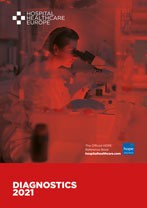The development of an AI system that was able to successfully detect cases of colorectal cancer with a similar accuracy to experienced pathologists is an important breakthrough in the diagnosis of this condition.
Globally, colorectal cancer (CRC) is the third most common cancer in men and the second most common in women, with over 1.8. million cases diagnosed in 2018.1 CRC is diagnosed by pathologists after a digital examination of a full-scale whole slide image (WSI). However, a major diagnostic challenge is the complexity of these WSIs; in particular, their very large size (>10,000 x 10,000 pixels), complex shapes, textures and histological changes after staining, all of which make the diagnosis both complex and time-consuming. In addition, with a recognised international shortage of pathologists combined with increasing levels of cancer, necessitates the introduction of supportive systems to help manage the workload. One increasingly used form of support is artificial intelligence systems, based, for instance on deep learning (DL). In fact, DL systems have already helped in the classification of CRC types,2 detection of tumour cell type3 and even prediction of survival outcomes.4
Using a supervised learning (SL) recognition system for CRC, a team from Department of Biomedical Engineering, Hunan, China, developed an AI system which was highly accurate for the diagnosis of CRC.5 Nevertheless, an accepted limitation to their system was that it was built using patches of scans previously labelled by pathologists but in practice, scans are often no comprehensively labelled which reduces the utility of the system in a real-world setting. In an effort to refine their system, the researchers investigated the value of semi-supervised learning which does not rely as much on labelled data.
For their current study,6 the team used 13,111 WSIs collected from 8803 patients to train and test the semi-supervised learning (SSL) model. It was evaluated by comparison with an SL model for patch level recognition, with patient level data and with experienced pathologists. In trying to further demonstrate the value of their SSL model, the team used samples of lung cancer and lymphoma and used the area under the receiver operating characteristic curve (AUC) to assess the performance of their model.
Findings
When comparing the SSL and SL model for patch-level recognition, the SSL model was superior, with the corresponding AUC values being 0.91 vs 0.79 (SSL vs SL, p = 0.017). Again, with patient-level data, the SSL model was superior with AUCs of 0.97 vs 0.81 (SSL vs SL, p = 0.002). Finally, the SSL model was comparable to that of six experienced pathologists, with AUCs of 0.97 vs 0.96 (SSL vs pathologists). Using both lung and lymphoma samples the SSL model was able to achieve similar performance to the SL model.
In discussing these findings, the authors commented on how their SSL model was able to outperform the SL model at patch-level recognition, even when there was only a small amount of labelled data. They added that the patient level data suggested that the SSL model might not require as much labelled data as the SL model.
In their conclusion, they felt that future work needs to focus on annotation and more effective use of unlabelled data to improve the efficiency of AI systems.
References
- World Cancer Research Fund. www.wcrf.org/dietandcancer/colorectal-cancer-statistics/ (accessed November 2021).
- Haj-Hassan H et al. Classifications of Multispectral Colorectal Cancer Tissues Using Convolution Neural Network. J Path Inform 2017;8:1
- Ahmad C et al. Texture Analysis of Abnormal Cell Images for Predicting the Continuum of Colorectal Cancer. Anal Cell Pathol 2017;8428102.
- Kather JN et al. Predicting survival from colorectal cancer histology slides using deep learning: a retrospective multicenter study. PLoS Med 2019;16:e1002730.
- Wang KS et al. Accurate diagnosis of colorectal cancer based on histopathology images using artificial intelligence. BMC Med 2021;19:76.
- Yu G et al. Accurate recognition of colorectal cancer with semi-supervised deep learning on pathological images. Nat Comm 2021: doi: 10.1038/s41467-021-26643-8.7.





